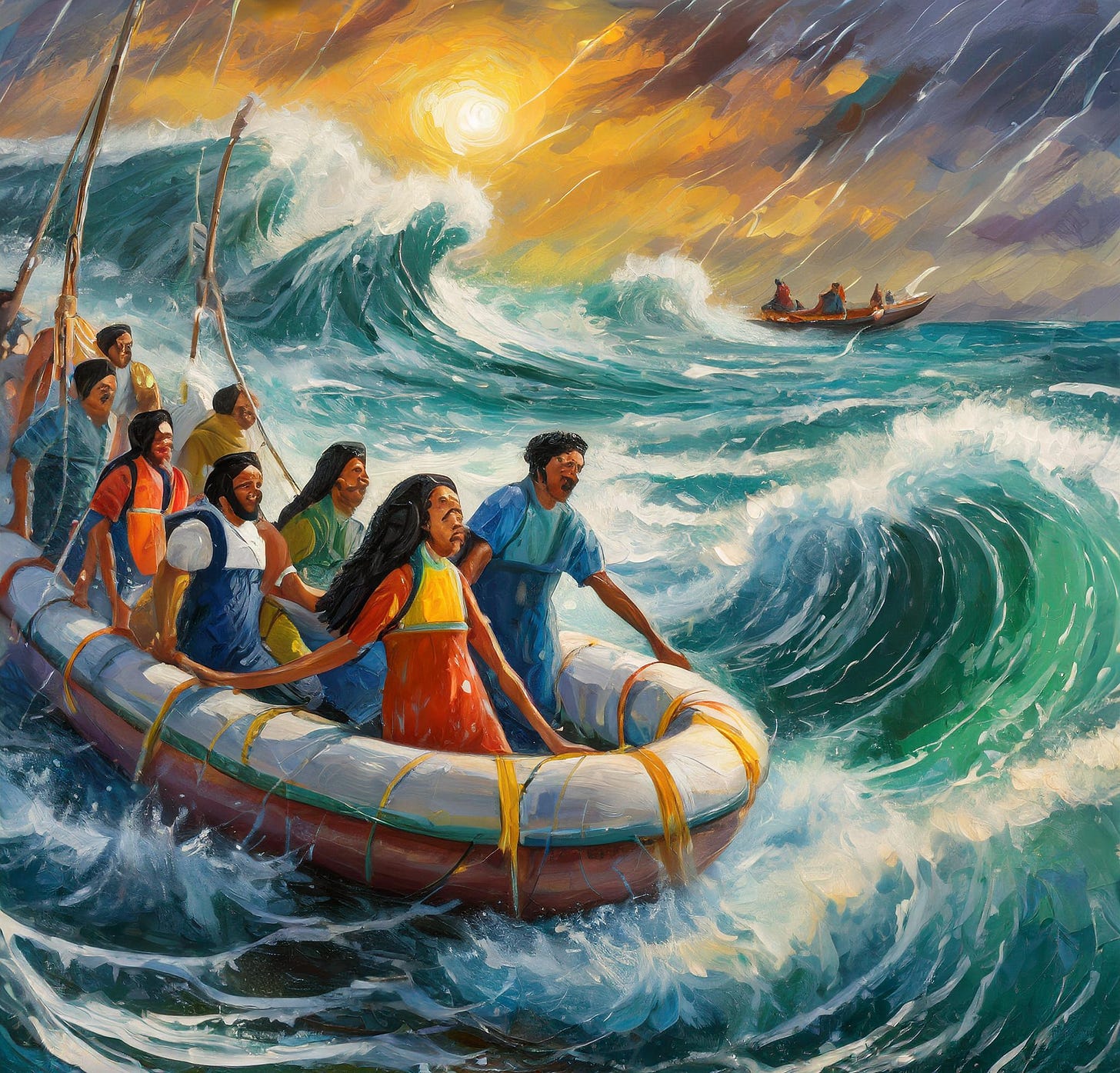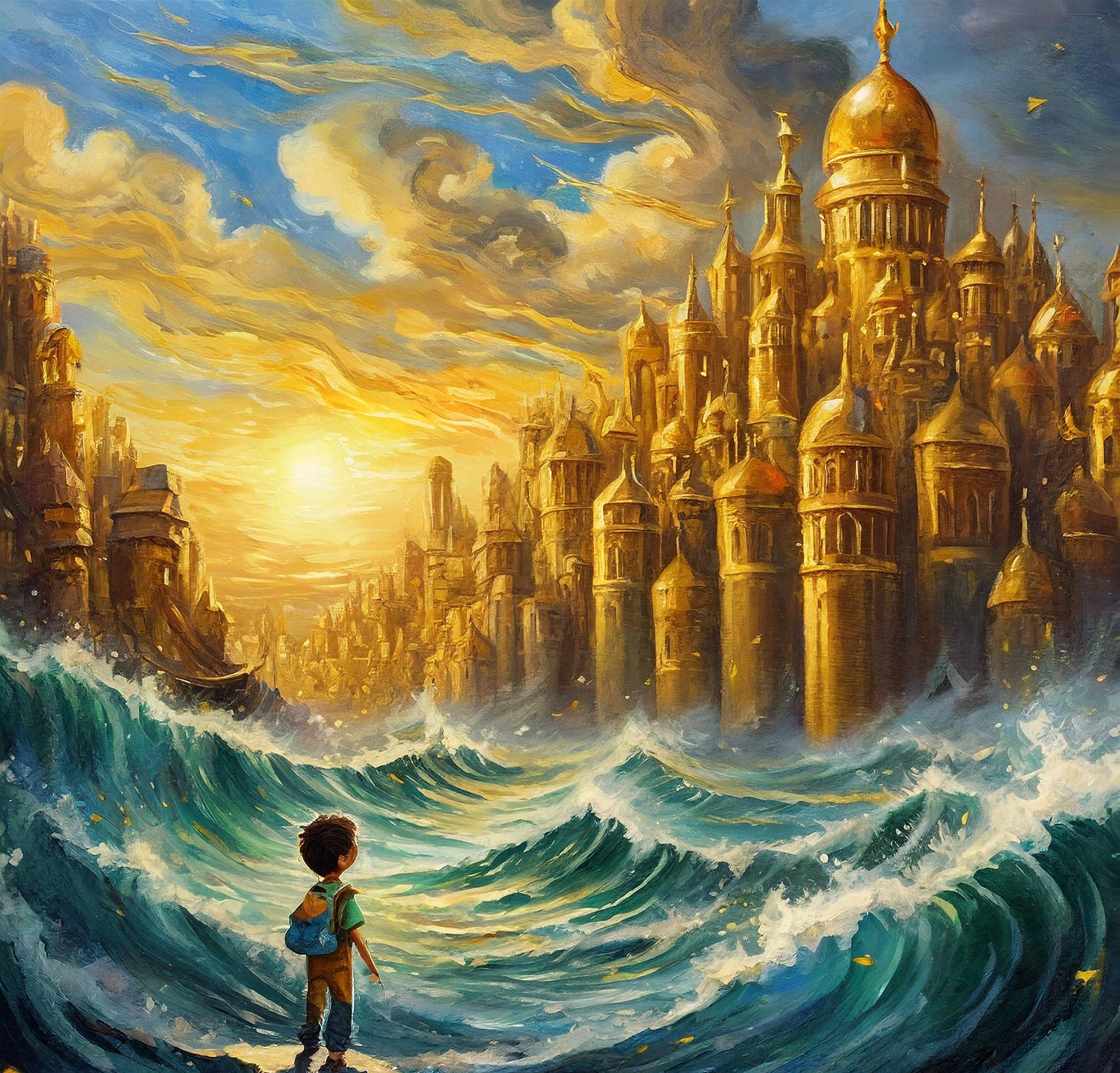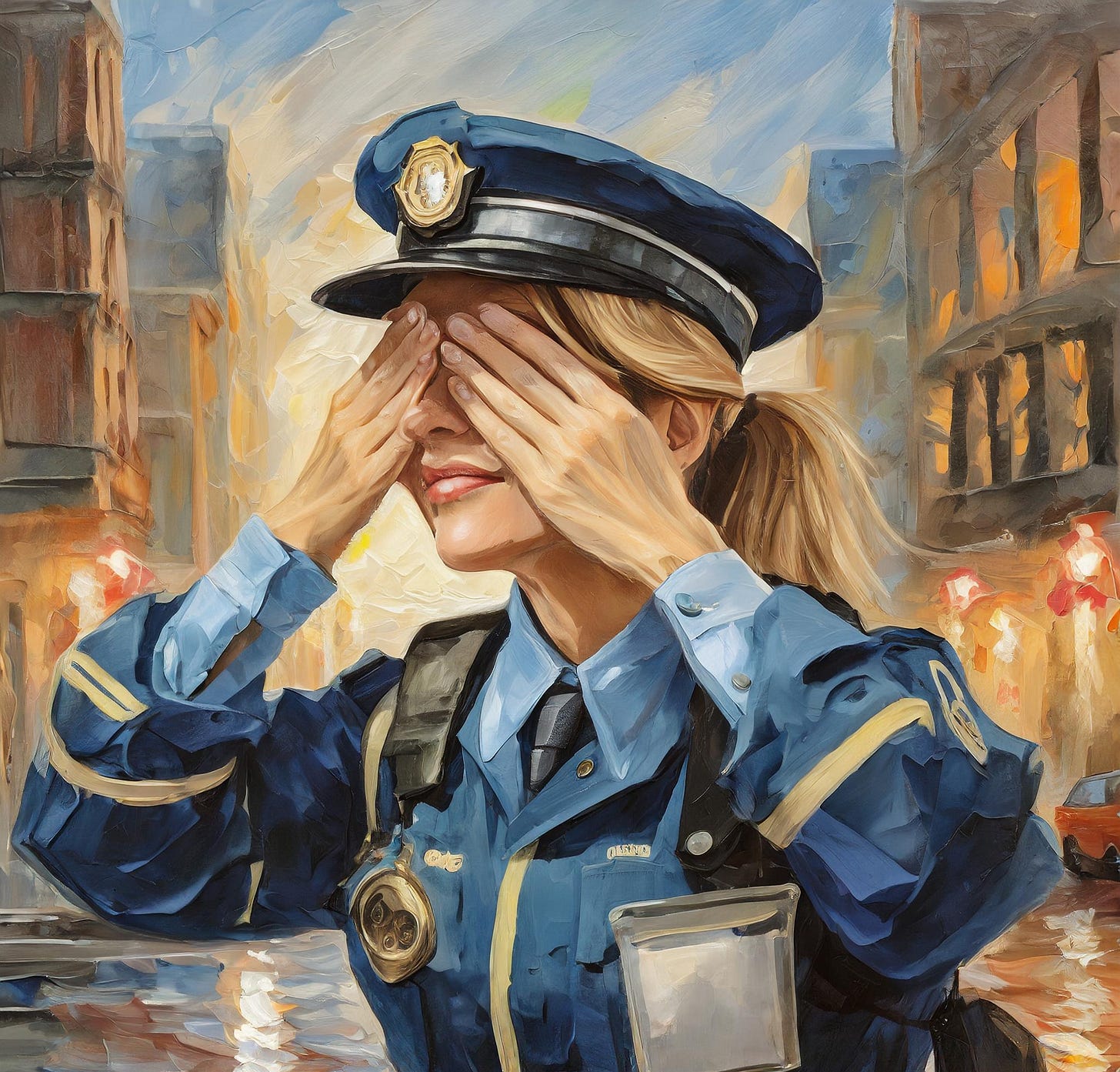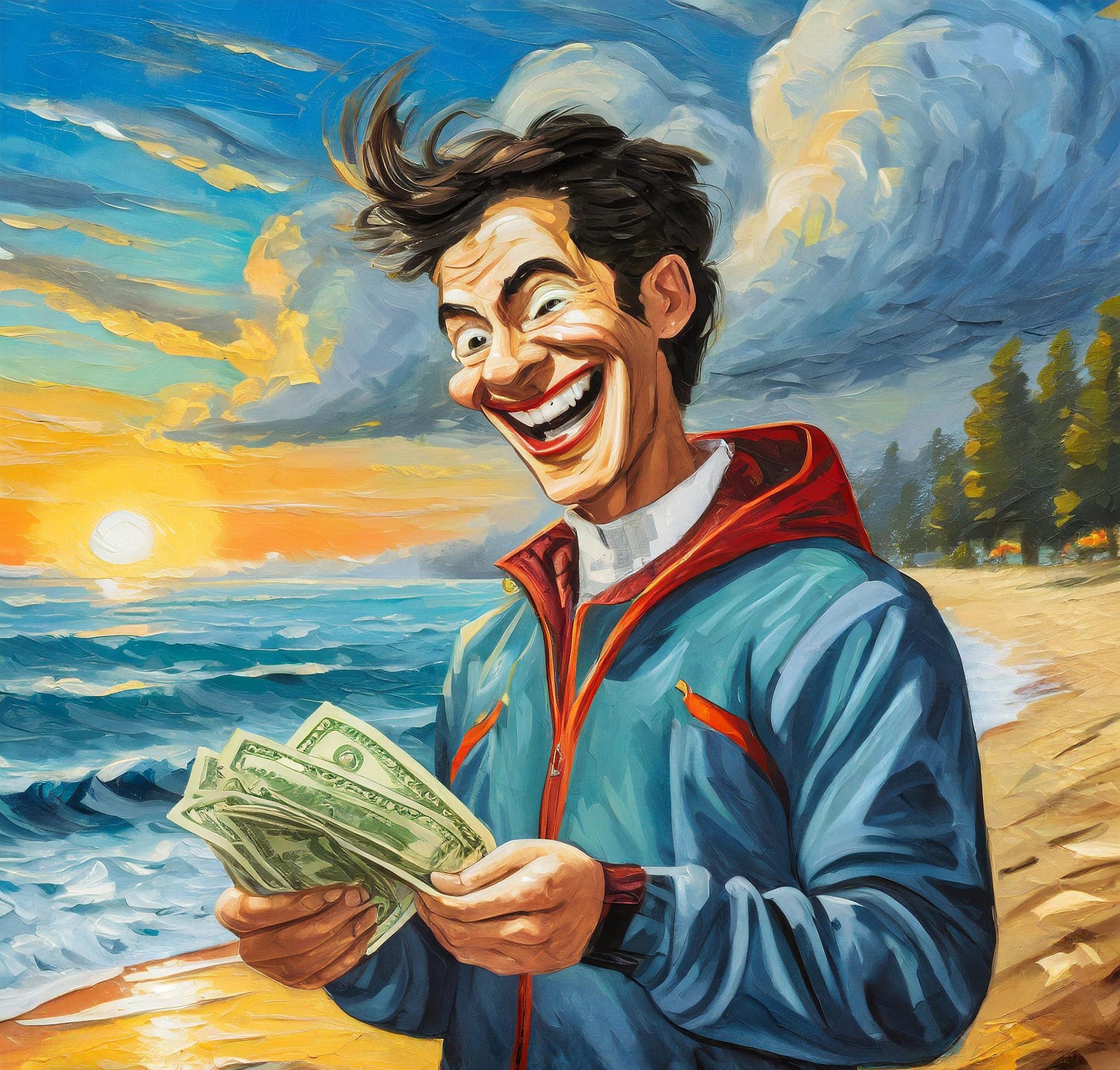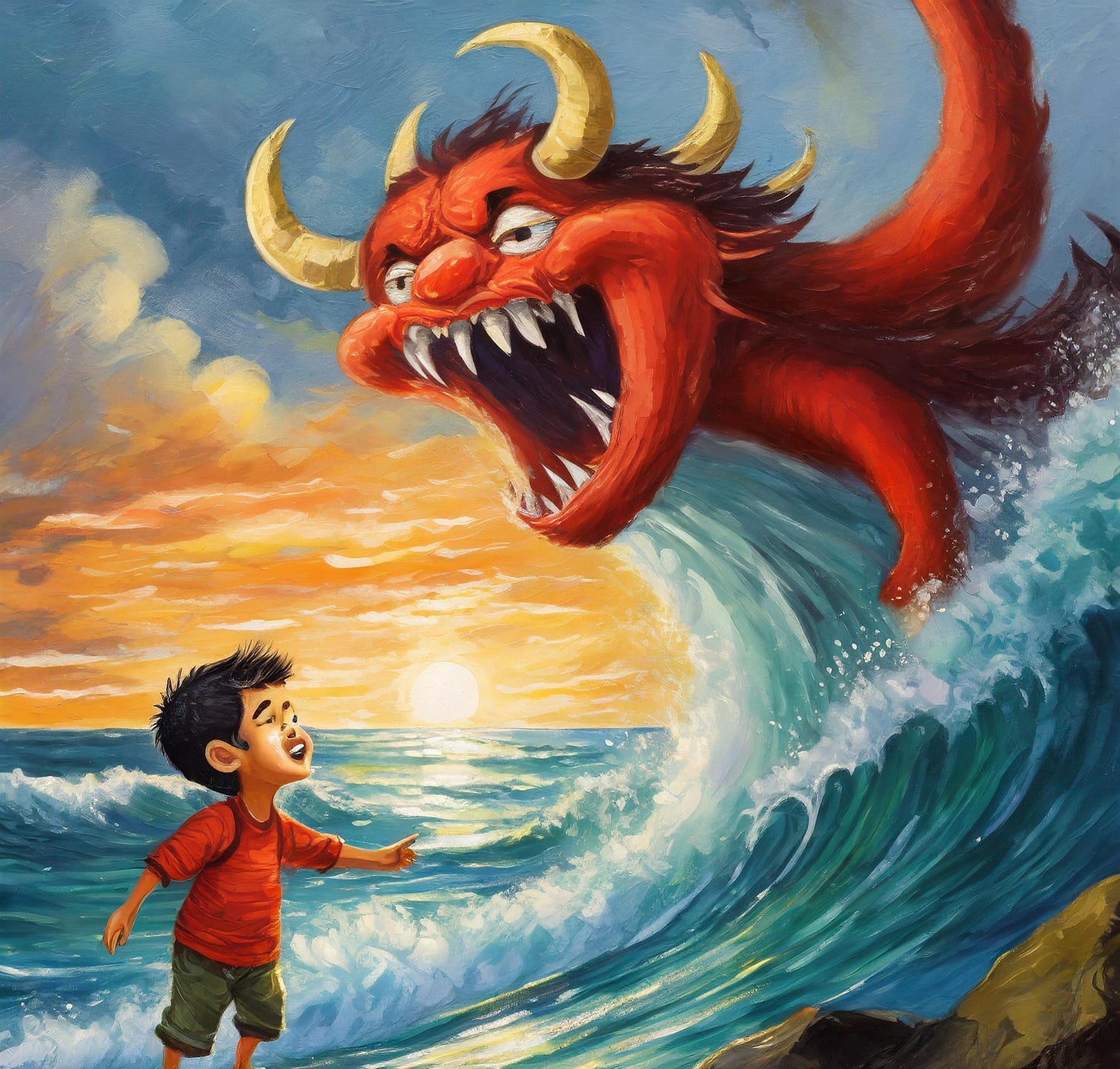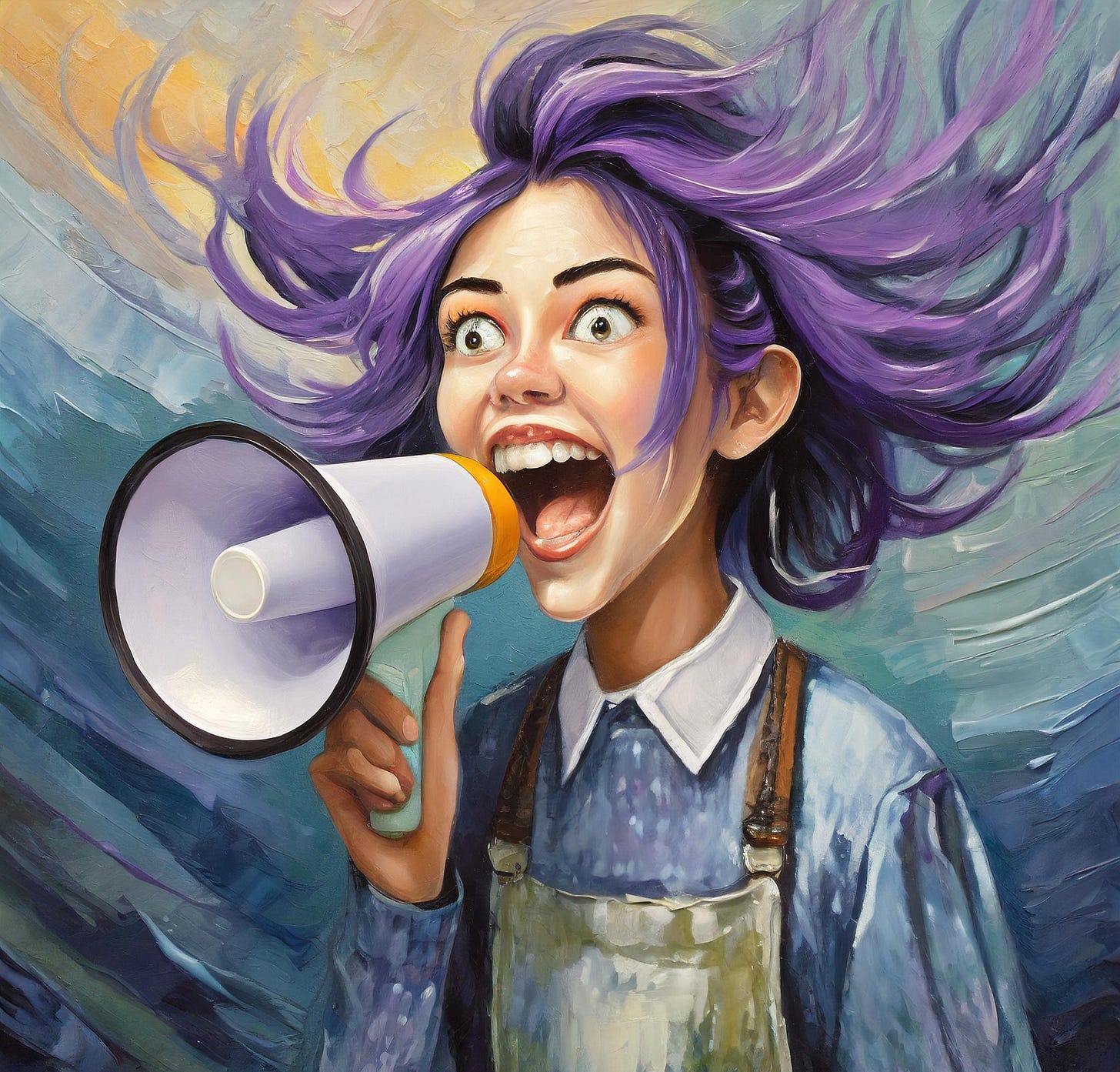Because Human Trafficking Is Profitable.
BBC News Lies #9: The death of a child in the English Channel.
On the night of January 14th, human traffickers launched their first crossing attempt of 2024. Five of the migrants would drown to death that night, including a 14-year-old child, Obada, and his adult brother, Ayser. They had drowned to death in freezing water less than 10 metres away from the shore.
The brothers had fled Syria together to escape the never-ending Islamic violence that plagues nearly all of the Middle East. They had first broken into Italy, where they were registered as refugees, and then France, before attempting to board a boat to the UK. The child couldn’t swim, and despite now being safe from perpetual Islamic war, the older brother decided to drag his child onto a small boat with 60 other people. The prize offered to those who successfully crossed the channel was apparently too great for the older brother to pass up. During boarding, a crush ensued, they were pushed overboard, and they died screaming in the freezing sea at night. The human traffickers made ~€120,000 from this, at over €2,000 a ‘ticket.’
Human trafficking is a foul stench. It removes people from state authority and places them into the clutches of gangs that see them as and treat them like they’re property. There is no payment you can make that will bring you out of debt with them, and there is no work you can do that will satisfy their desires. The brothers had already had their taste of human traffickers after attempting a similar crossing between Tripoli and Italy. As the story goes, they ‘ended up’ in the hands of the local militia; it’s likely they were sold as slaves, or at a minimum, hostages. They would be imprisoned and tortured for a month, until they were able to negotiate a deal where the boys’ uncle in Dubai would send $900 per brother for their release. After returning to Libya, they once again paid another gang of human traffickers to take them to Italy, and this time they very narrowly survived: the boat was stranded for 22 hours, and the Italian coastguard rescued them.
This article will focus on the story of these brothers, as written by BBC News journo Andrew Harding.
Death in the Channel - what led a 14-year-old boy to make fatal journey? - by Andrew Harding
We will discover that Andrew’s grammatically incorrect titular question of “What led a 14-year-old boy to make fatal journey” is answered again and again across the entirety of the story. However, at the end, the conclusion misses every key point in the very story Andrew has covered. I will be sure to point these out. There are also many debateable presuppositions contained within the article, and not enough intellectual interrogation was made in key areas of the story.
In the article I will use the term HTSC - the Human Trafficking Supply Chain. This term is to describe the web of organisations that are intimately involved with assisting illegal migration journeys. The major stakeholders here are people smugglers, drug traffickers, information middlemen, corrupt bureaucrats & police, and even refugee charities & NGOs. These are the organisations that are integral to ensure a thriving human trafficking market and fostering a steady flow of victims into the United Kingdom and Europe more generally.
We will begin with the conclusion and then move onto the rest of the article:
How should Obada's story be judged?
Many people will be inclined to criticise his parents and family for risking the life of a child on such a dangerous journey. Others, not least those with direct experience of life in war zones like Syria, may argue that it is a measure of the family's desperation that they took such a step.
This is the entirety of the article's conclusion. It doesn’t expand into questioning border policies, the misaligned motivations, the legal loopholes, the incentives to risk your life on the English Channel, the enormous legal HTSC that supports human trafficking—nothing. The article criticises in a very establishment-compliant manner and goes no further.
It doesn’t even take the ground that risking a child’s life to go from France to Britain on a small boat—a child that can’t swim—is wrong. Simply that “many people will be inclined to criticise”. Journalism isn’t supposed to be bereft of moral objectivity; it is adequate and fair to say that such an act is an atrocity, an abuse, an act of great violence, on the life of the child that couldn’t swim.
However, we will find more answers and actionable conclusions and be able to ask ourselves better questions with an interrogation of the rest of the article.
Over the past months, the men now surrounding Obada on the slipway - nearly a dozen of them from the same neighbourhood in Daraa, a city in southern Syria - had been trying to toughen the boy up, telling him to be strong, to look after himself, to be a man. But it wasn't helping.
The ‘slipway’ is a short, sharp concrete ramp into the sea in the town of Wimereux. Looking at the picture, it looks like a terrifying way to board a boat; there is absolutely no angle that works for embarking, and if you fall into the sea, you’re going to struggle to get out. Regarding the other Syrian men about to attempt the journey, the camaraderie would be short-lived. It was these very men, attempting to console a terrified child, who would end up pushing him and his brother off the boat only to speed off into the night, leaving them in the sea, totally aware that the child couldn’t swim. What does this teach us about the types of individuals making this crossing? It’s one thing to flee the forever Jihad; it’s an entirely different thing to attempt to flee France. Later in the article, it says there were also another two young mothers with teenage children attempting that same crossing. These are not actions guided by rationality; they are a mixture of lies from human traffickers and the desire to access the bountiful benefits system. Add a mix of that third-world naivety and, for the young men, a dangerous journey to overcome, and you are left with a powerful incentive.
Human traffickers are sloppy at best. Once the money is in their hands and the rubber boats are inflated, they point in the direction of Britain and run off with the money. They don’t care if you die. They don’t care if you don’t even make it onto the boat. They’d given the migrants bike inner tubes to act like a life vest and instructed them not to inflate them until they were well on the way. There were 60 people looking to board this rubber dinghy that night; like an evil EasyJet, it was overbooked. This is all very normal for this industry. Despite this, the human trafficking machine continues to operate with no sign of slowing down.
This leads us to our first answer to the journo's question: because the human trafficking machine has been allowed to flourish for decades. If the HTSC had not helped to grow an enormous and permanent customer base for human traffickers, there would never have been such demand. If Britain and France had nipped the issue in the bud, dealt with human traffickers harshly, and collapsed the entire operation, the human traffickers would never have been able to make human trafficking as routine as it has become.
Nada had made the same dangerous crossing two years earlier, ignoring his father, at home in Daraa, who had initially urged him to be patient, suggesting the war in Syria might soon end.
"But we've waited for 12 years, and it is not finished. There's no safety. There was no (other) way to ask for asylum," Nada remembers telling his father. Nada is a bearded, soft-spoken man, and tall, like all his brothers.
Nada had chosen to travel to England because an uncle had already made the journey almost a decade earlier and been granted permission to remain. Both men had come illegally because, Nada said, there was no alternative.
That last line about asylum being impossible is a lie sold to human trafficking victims. It is part of deceptive marketing. However, the migrants will be broadly aware that the benefits package offered in the UK for breaking into the country is vast compared to other countries. Since Britain does not arrest and deport people entering illegally, there forever remains an attractive proposition at the end of the cold sea. It is an enormous legal loophole perpetually begging human traffickers to exploit it. Families like these just don’t understand that you shouldn’t risk your entire life and the life of a tiny child that can’t swim to go from France to Britain, no matter your legal status. Yet there lies the carrot at the end of the minefield. Asylum Aid, a key advocate of the HTSC, has broadcast to the world that the most effective way for a Syrian refugee to enter the UK was illegally via the cold English Channel. It should be no surprise that, as a result, there are many now serving as fish food at the bottom of the channel.
Nada, the older brother, who had successfully survived the same journey, was reaping the rewards. His accommodation was paid for, he’d been granted permission to stay, he was given a job in a warehouse, he’s being taught English at a college, he's about to bring his wife over from Syria, and he will soon be studying law at a university here in the UK. Nada had encouraged his two younger brothers to make the same perilous journey, telling them all about the free things he got as a reward for surviving the gauntlet. The article later also reveals that their father, Abu Ayeser, was a big part of the pressure on his children to run the gauntlet. He’d envisaged being invited over in some legal fashion so that he could get healthcare for his multiple health conditions. Sadly, the truth was that there was no legal way for that to happen. In fact, there was also no sure situation for asylum seekers that broke into the UK: the Illegal Migration Act of July 2023 denies people the right to claim asylum from within the UK, but as the article notes, it’s just resulted in a confusing limbo, albeit one still awash with plenty of benefits. Despite this, Obada told his older brother in England that he wanted to go there because he was there.
Here lies our second answer: because one of the other older brothers had made the journey previously, survived, and was now having most of his life paid for by the British taxpayer. They believed that not only could they receive the same treatment, but they could even bring over the parents for healthcare. This is another key component of the HTSC. Without the allure of hotels, money, food, houses, education, university, healthcare, and an all-round devouring mother approach to illegal immigration, the child would never have been placed in danger once they’d entered a safe country. By not offering such a bounty to those who risk their lives, you would remove the incentive to risk life. They’re in France; the war is long behind them. This final journey had nothing to do with survival and everything to do with the limitless bounty offered to survivors of the English Channel gauntlet.
And so, in early January, Obada, Ayser and half a dozen Syrian friends arrived in Calais. They pitched tents under a bridge, trying to avoid the French police who would sometimes take the tents and order them to "move on".
The BBC has spoken to a local charity that sought to help the group in Calais. Obada was offered shelter, as a minor, but said he wanted to stay with his brother. The organisation, which is not being named because of the sensitivity of its work, was also in contact with at least two other teenage boys who would go on to board the same boat that Obada tried to take.
A charity representative told us the smugglers in Calais prevented some of these other boys from "deciding for themselves", and that they also felt "under pressure from their families".
Charities play a key role in the HTSC. Despite good intentions, the results of their work in Calais have meant that there is a never-ending, never-moving customer base for human traffickers. Without them, it would be impossible for such a large number of migrants to stay in Calais for so long, awaiting their chance at the English Channel gauntlet. It was because of charity that these Syrians spent months in Calais. Is it right for so much money to be spent by charities and the state to ensure that thousands of migrants can hang around this specific area nearest to the UK? At what point does one begin to realise that these charities are, in fact, integral to the HTSC? Charities have a tough time when it comes to complicated issues. Often, they choose blunt and blind solutions to complex issues. For example, sending food aid to Mogadishu during the 1990s famine seemed like the right thing to do, until you realise all of it was stolen by the cruel warlord Mohammed Aidid, who withheld it from his tribal enemies, who all starved, and sold it for profits to buy weapons to kill and maim more people. With the colossal charity resources spent in Calais, one may believe that desperate people are being shown compassion, but then you have to realise that none of them were forced into Calais, that they have many other opportunities for safety and a life that doesn't require risking death, and that charity resources are directly contributing to human trafficking profits. Thus, the market expands, the demand increases, and the cycle of suffering is sustained.
One seriously difficult part of this part of the article is the casual reference to the fact that the charities are seemingly in regular contact with human traffickers. How close is the connection between the charities and these foul gangsters that deal in human lives? This may be one of the reasons why this organisation is operating in secret. Considering it’s still a criminal enterprise, at what point does the charitable work become illegal and directly contribute to deaths in the channel? Alongside growing the HTSC client base, it’s likely that activists working for these charities have been directly involved in planning and operating boat launches and truck break-ins. Care4Calais is the flagship, alongside a long line of charities that participate in the human trafficking market. They’re deeply involved in the most toxic forms of political activism and are quick to decry any kind of investigation or questioning of their role in human trafficking as akin to nazism. They are completely complicit in human trafficking crimes.
What is the role of the police and local authorities in protecting children? They’re 100% aware that there are children being dragged into extremely dangerous situations by mothers, brothers, and fathers, and that they’re at huge risk of death. They’re completely aware that dozens of migrants die suffocating in trucks or drowning in the ocean in single incidents, yet it seems the police are content to simply ask migrants to move on when their camps grow too much. The authorities are aware that those migrants hanging around Calais are just waiting for their opportunity to commit a crime, and that they’re often taking children with them too. Where are the human rights protections that are supposed to prevent children from being exploited and abused like this? What legal class do those migrants in Calais exist in that allows them to prepare with intention for the smuggling of their children in extremely dangerous situations? Do the French simply not enforce child protection laws in Calais for migrants?
This exposes something very deeply corrupt in our society and provides a third answer to Andrew’s titular question as to why a child died in the English Channel that night: because corruption has infiltrated both the state and the NGOs and charities that serve the HTSC. Police do not arrest men for breaking into their country. Police do not arrest the adults that would drag children into the sea, often enough to their deaths. The state is cooperating with human traffickers by turning a blind eye to the migrant build-up in Calais, and charities are cooperating by maintaining the client base indefinitely using government money and charitable funds. It is a massive machine, and it is deeply corrupted by a laissez-faire compassion that is constantly killing people.
Speaking about one of the other boys, the representative said: "He phoned us to tell us he was afraid. He told us that it was his parents who forced him (to attempt the crossing)."
After more than a week, the group were told to get ready by Syrian smugglers to whom they had paid €2,000 each to take them to the UK. The forecast was good. They would leave on Saturday night.
The wind had died down along the coast. But the temperature was only just above freezing, and the sea was perhaps 7C.
In the dark, in Wimereux, Obada tried to join the crush of people attempting to board the inflatable as it was moving away from the slipway. But immediately, he and Ayser found they were out of their depth and thrashing around in the cold sea.
On the same note as before, this is a child crying out in terror that he is going to be dragged into the sea and drown. Where was the call to the authorities? Where was the concern for the child’s life? This is the ‘legal’ side of the HTSC: police and charities are completely complicit in this perpetual tragedy. They don’t intend to contribute to the deaths of dozens of people in single drowning incidents; they’re not trying to make human trafficking gangs extraordinarily rich. But this is the result.
The story leading up to the botched crossing attempt is an equally difficult read if you pay attention to what is happening. The smugglers charged €2,000 each for 60 people. They were Syrian, and most of their victims were also Syrian. With a €120,000 investment from their own countrymen, they were provided a <€10,000 rubber dinghy and some motorcycle rubber tubes as life preservers should they fall into the sea, and they weren’t even inflated. There were far too many people to fit in the boat, as is always the case, hence the drownings and never-ending rescue missions. Those Syrian smugglers condemned their own countrymen to a brutally dangerous situation and scarpered with all of the money. What’s more, those other Syrian migrants who boarded the boat were only just earlier trying to calm a highly distressed Obada who did not want to go into the ocean again. Obada had already been on illegal boat crossings twice, and both times resulted in disaster. However, that countryman compassion disappeared immediately when the boarding began. The migrants crushed each other to get onto the boat, pushing the smaller, weaker boys into the ocean before speeding off into the night, fully aware that a child that couldn’t swim was in the ocean screaming for help.
Obada was in that situation in the first place because of pressure from his parents and his brothers. The brothers wanted all of the benefits afforded to their eldest brother in England, and the parents wanted NHS treatment for their health conditions. In fact, the parents are using the media coverage to still demand that they be transported into Europe to see the body of the child they’d condemned to this journey and receive oxygen and treatment for his ill health. It’s not clear who they’re asking. They’re obviously in deep distress, and the older brother in England admits an enormous burden of guilt for goading them into their fatal journey.
This gives us our fourth answer to Andrew Harding’s question: because rewarding human trafficking will invite the worst kind of behaviour from ordinarily normal people. The parents pressured their children to make the journey, and it resulted in their being imprisoned, tortured, stranded at sea, and later, their deaths. The older brother in England encouraged them to risk their lives too. The French police never intervened to protect the child. Calais charities and NGOs ensured the young brothers could hang around Calais, waiting for a chance to run the gauntlet, and were aware that human trafficking gangs were controlling these vulnerable people. The UK waves a carrot across a minefield, enticing the migrants to risk their lives, and then they act shocked when someone treads on a mine. Charities in the UK encourage people to make the journey too, broadcasting their support for asylum seekers to risk their lives running the gauntlet. This is how and why Obada died. Nobody stopped them at any point. Nobody discouraged them. Nobody prevented this tragedy, as nobody had prevented any of the previous tragedies. Everybody in the HTSC is complicit, and they are all responsible for Obada’s excruciating final moments as he screamed for help. It is a Hunger Games: survive the seas, get BRPs.
It was another of the Syrians in the group calling. He had managed to get Ayser out of the water first, but too late. And then Obada's body was pulled ashore. Unable to swim, they had both drowned perhaps 10m (11yds) from the slipway.
In his bedsit, Nada crumpled into tears at the memory of answering the call. He began to sob, his chest heaving, then he wiped his eyes.
If you knew then what you know now, would you have stayed in Syria? I asked him.
"Yes. After what happened to Ayser and Obada, I would have stayed in Syria," he replied.
Do you wish Obada had stayed in Syria too?
"Yes."
Do you feel guilty about encouraging him to make the trip.
"Yes. Yes," he said.
Nada, the older brother, had initially made the journey and was living relatively well. Education, employment, housing, healthcare, and university—all of it was granted to him courtesy of British taxpayers. Although some may see the benefits as excessive, and some certainly are (reference my article "Britain’s Borderless Benefits"), the UK is the birthplace of liberal democracy, and that population-wide compassion for people who are struggling is strong. It is well rooted in our Christian heritage, even if some aren’t aware of it or dislike that connection because of a vague anti-religious bigotry. However, it is not sustainable considering the vast quantities of people that would take it if they could, hence the regular run of the English Channel gauntlet. There isn’t a universe where Britain can manage the world’s refugee crisis, let alone take care of all of their needs.
One truth that is often ignored is that people do not exist in a vacuum. Those brought up in irredeemably backward or antithetical cultures will never be assimilated into a culture that is so completely different as ours. There are cultures where many forms of rape aren’t considered crimes. There are cultures where female genital mutilation is acceptable. There are cultures where slavery is tolerated, where stoning to death for adultery is justice, where honour killings are demanded by their gods, where little girls are married to older men, where women are seen as property, where music is considered sinful, where speaking freely will get you killed, where being gay will get you executed, where paedophilia isn’t considered immoral, where speaking out against the government will have you disappeared, where cannibalism still exists, where mob killings are fair game, where other races have lower legal statuses, where blasphemy is punishable by death, where apostasy is punishable by death, and there is much worse. How do you reconcile that person with the people and the culture of the UK? How do you integrate someone who becomes violent when they hear their god insulted? How do you live amongst someone who would, if asked by the right people, be prepared to kill and die in a terrorist attack? What happens to the natives when entire towns are colonised by people who see little white girls as whores and fair game for rape?
Here we find a fifth answer to the titular question: because Britain offers a fake salvation. With previous waves of illegal immigrants and asylum seekers being given the red carpet treatment, everyone else wants to get a piece. Human traffickers use these stories, a mixture of lies and truths, to sell their €2,000+ tickets to people who believe they too will get free houses and a free university placement. They even use videos of scantily clad white English girls going out for the night as advertising on TikTok to encourage the young men to pay up and risk their lives. Life in Britain for every single victim of perpetual Islamic violence, famine, government oppression, and more is a total mirage, and it doesn’t exist.
"The biggest fault is the laws of Europe who make the life of the refugees impossible. Who give them not any rights. Who make their life here in Calais and all over the borders impossible. And we have to remember that. It is the fault of the European laws," a local French woman told the sombre crowd.
Back in Daraa, Obada's parents sent us a video of their son's empty room.
"We want to see my children for the very last time. This is my one request. The little one was 14 years old. I wish to see him before he is buried," said his mother, Um Ayeser, between sobs.
"I am an ill man. I need oxygen to breathe," said his father, Abu Ayeser.
A naive French activist declares that the Europeans are at fault for the deaths of the five migrants that night during a candlelit vigil in Calais. What is she talking about? Is it not the fault of never-ending Islamic violence that their home is torn apart by war? Is it not by the good graces of European beliefs on human rights that they were able to claim asylum once they’d entered the not-war-torn country of Italy? Is it not because of the most generous and compassionate people of Italy that those people are provided shelter and a route to life? That charities and the state spend so much supporting migrants, legal and illegal? Does this naive girl think that these migrants are making good decisions? Does she support human trafficking efforts? "The fault of the European laws." It’s so painful to hear such naivety. She must truly believe she lives in a state that is unkind and/or evil to the migrants that fund human trafficking and often die at sea between France and the UK. Is it even financially possible to do more? How much more should Europeans be taxed? How many more services should the government remove? How many more welfare provisions should be removed from native access to assist migrants? With the colossal sums of money spent in Britain on hotels, with the council houses and social houses prioritising migrants over the locals, and with the enormous roster of benefits provided, what more can we surrender?
Obada’s fatal trip was never just about him. It wasn’t just about his brother. It was also about his parents. Half a dozen people, likely more with the family’s other relatives, wanted Nada’s (the brother in England) life. Where one is granted such a bounty, there are multiple others who see it and want it. Even Nada had made the journey because another uncle had done it and also received the benefit bounty. As every service buckles under the weight of client volume, as the social benefits system bankrupts the country, as taxes are raised, and as the cash printing devalues our money, it will still not be enough. It will still not be “justice” to those naive activists. Extreme leftists believe that everyone, even marginally to the right of their radical positions, are the ones who are preventing the great narnia of migrant heaven from flourishing.
This is the sixth answer to the journo from the orthodox news media: because nothing could ever be enough. There can never be enough resources in Britain for the planet's refugees. There can never be enough money. It’ll never be enough. Europe invented the entire concept of seeking asylum and built it into their systems. Something that never existed before in the human lexicon. Yet it is apparently the fault of Europeans to not have an even more open border, an even bigger benefits package, that they don’t build more and more homes for refugees, that they haven’t expanded their state infrastructure enough to accept every single one? It’ll never be enough.
The founding reason behind good border security is to prevent unknowns from entering your country and to prevent the leakage of social ills from abroad from leaking into yours. Those ills exist within many of the people who attempt to mass-migrate into Europe. What was once unthinkable in Britain has become commonplace. Acid attacks, machete violence, child rape rings, slavery, bonded servitude, and people trafficking, to name a few. It’s also important to recognise that the suffering of human trafficking victims doesn’t end if they survive the English Channel gauntlet. Your traffickers could have jobs lined up for you, and your choices are selling drugs, renting a Deliveroo account, or working in a local business for cash. You are usually being exploited, and some are even enslaved. You also usually still owe money to those human traffickers or the gangs that they work with, and they’ll be sure to collect in some fashion. Women are prostituted and raped. Kids are enslaved (this is now a thing in the UK all of a sudden). Men work all day every day for next to nothing, often in restaurants or factories. News stories about people who are now adults who were trafficked into the UK as child slaves are an entire genre of news. Mo Salah, the runner, is even one of those people, with an entire fake backstory. He was sold into slavery as a child, imported into Britain with no questions asked, and lived in servitude as a child until he was able to get out.
The prize for surviving the gauntlet is big. You’re not arrested for entry into the country, and you could be invisible to the state. You can navigate bureaucracy to get free money and services from the state, often by simply lying. To stop the British Hunger Games across the English Channel, the state needs to arrest illegal immigrants and/or turn back boats on their way to Britain. Enforcing this for a few months will evaporate the demand for human trafficking. If migrants in boats are treated like lost French tourists and simply taken back to France, the first set of migrants may try a second time; maybe they can afford a third, but they’ll eventually surrender their suicidal desire to run the gauntlet, as will everyone else. The UK has begun to take some steps, or at least Rishi Sunak has claimed to. He didn’t stop the boats; rather, he slightly discouraged them. But nothing has changed.
The HTSC is drenched in blood. The hands of those charities that support and encourage human trafficking are covered in blood. The hands of the French state and police that do not intervene in obviously dangerous and abusive behaviour towards children are covered in blood. These Syrians, among many others, escaped Syria, only to die in the English Channel, and despite every opportunity for states, NGOs, and charities to do something to stop them, they kept quiet and continued to participate in a routine of death and suffering. They are drenched in blood.



